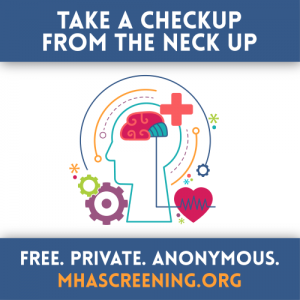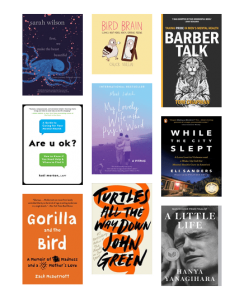A guest post by Ally Dowds, our Health & Human Services Research Specialist.
Throughout the month of May, there is a national movement to raise awareness for and support the millions of individuals affected by mental illness. Mental illness is quite common. It takes shape in various forms such as depression, post-traumatic stress disorder, anxiety, eating disorders and schizophrenia.
This year, mental health and wellness is especially important as the pandemic caused many to feel isolated and/or stressed. It is a critical time to support each other, or to seek out tools to help create healthy routines, cope with a loss, or connect with others.
Check out the toolkit materials from Mental Health America (MHA) with links to informational handouts. The handouts are full of fast facts, tips for success and guidance for journaling your process. In addition, they’ve included local organizations whose work complements each of the following six elements in hopes of connecting you with new outlets or avenues of support.

Mental Health America
MHA is a community-based nonprofit devoted to promoting the overall mental health of all Americans. Its 2020 campaign, Tools 2 Thrive, provides practical tools for people to use in the long-term or adapted short-term to help cope with COVID-19, social distancing, and grief. Check out its six elements plus a self-screening test to check in on your mental health. Each link will give you access to a MHA file containting fast facts, tips for success and guidance for journaling your process.
1. Owning Your Feelings
Fenway Health in Boston offers many support groups to connect you with health professionals, provide supportive communication and conversations, teach you coping skills, or empower you with knowledge about your mental health. In-person and telehealth appointments are available.
2. Finding the Positive
Grappling with the loss of someone you love, your job, or normalcy? MHA recommends looking for opportunity or remembering the good in the things we’ve lost as a way to grieve and recover. Canva is a free, web-based graphic design tool that allows you to make photo collages, cards, storyboards and much more allowing you to preserve memories and honor your loss.
If you are in need of a professional referral to help you adjust, don’t be afraid to reach out for help by contacting any of the hotlines at the end of this post.
3. Eliminating Toxic Influences
SafeLink is Massachusetts’ statewide 24/7 toll-free domestic violence hotline operated by Casa Myrna. SafeLink hotline advocates are multilingual, and all calls to SafeLink are free, confidential, and anonymous. Anyone can call for information, support and resources at 1-877-785-2020.
4. Creating Healthy Routines
One of the options out there to reboot your routine and de-stress is by taking a cooking class. There are virtual cooking classes available at Christopher Kimball’s Milk Street Cooking School. They are available for free through May 31, 2020. You can use them to learn how to spice up your recipes, create savory vegetarian meals, and discover sweet flavors in your baking.
If the thought of frying up new recipes creates additional clutter and chaos, MHA offers further advice on how to cope with the current disruption caused by the COVID-19 pandemic to help us realize what we can control in our lives.
5. Supporting Others
Tap into your local mutual aid societies to help others pick up groceries, walk their dogs, share recipes, or to donate money to support individuals and local businesses. Don’t know where to start or what you can offer? Check out the BPL’s post on COVID-19 Mutual Aid Resources.
6. Connecting with Others
 Add your voice to NAMI’s You Are Not Alone and OK2Talk blogs. Both allow video, picture or written verse to share your story and participate in the power of connection. OK2Talk is aimed toward teens and young adults and is available in English and Spanish.
Add your voice to NAMI’s You Are Not Alone and OK2Talk blogs. Both allow video, picture or written verse to share your story and participate in the power of connection. OK2Talk is aimed toward teens and young adults and is available in English and Spanish.
Free, Confidential, Online Screening Test
According to MHA, many people do not seek help during early stages of mental health because they do not recognize its symptoms. If you decide to complete the test, you will receive information about next steps based on results. Please note: A screening is not a diagnosis. As always, consult a medical professional with any concerns or questions.
How can your local library support you?
The BPL has a lot of wonderful blog posts connecting our patrons to various health, wellness, community, and employment resources. Practice mindfulness in nature, escape to worldwide art museums, seek out small business help, or improve your physical and mental health and wellness from home.
We also have created two booklists to honor Mental Health Awareness month covering eBooks and eAudiobooks. Looking to interact with people or connect virtually? Attend a virtual BPL program like author talks, express your feelings through one of our writing and journaling workshops, or discuss a new book at a library branch book group.
Hotlines & Local Resources
Department of Mental Health
Emergency/Crisis Line: 1-877-382-1609
Available 24/7
NAMI Massachusetts
COMPASS Hotline: 1-800-370-9085
Available Monday -Friday, 9am - 5pm
Call-in Support Groups on Mondays, Tuesdays, Wednesdays, & Saturdays
National Suicide Prevention Lifeline
1-800-273-8255
Spanish Language: 1-866-628-9454
Deaf and Hard of Hearing: 1-800-799-4889
Samaritans Statewide Helpline
1-877-870-4673
Available 24/7, talk or text
Veterans Crisis Line
1-800-273-8255 (press 1)
Available 24/7, talk, text, or chat online
The Trevor Project
TrevorLifeline: 1-866-488-7386
Available 24/7 Hotline, talk, text or chat online
Available 24/7, talk or chat online




Add a comment to: Self-Care During Mental Health Awareness Month